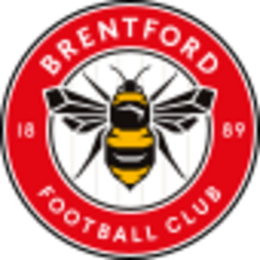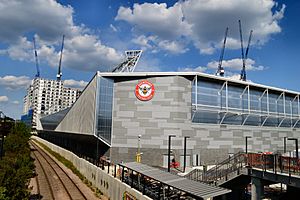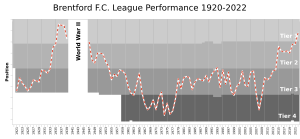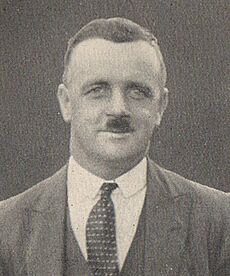Brentford F.C. facts for kids
 |
||
| Full name | Brentford Football Club | |
|---|---|---|
| Nickname(s) | The Bees | |
| Short name | Brentford | |
| Founded | 10 October 1889 | |
| Ground | Brentford Community Stadium | |
| Capacity | 17,250 | |
| Owner | Matthew Benham | |
| Chairman | Cliff Crown | |
| Head coach | Keith Andrews | |
| League | Championship | |
| 2018–19 | Championship, 11th of 24 | |
|
|
||
Brentford Football Club is a professional football team from Brentford, England. They are known as "The Bees" and play in the Premier League, which is the top football league in England. The club started in 1889. For many years, they played their home games at Griffin Park, but in 2020, they moved to the Brentford Community Stadium.
Brentford first played amateur football. They joined the London League in 1896 and quickly moved up to the Southern Football League in 1898. They won the Southern League Second Division in 1900–01. In 1920, they became part of the Football League.
The club had a very successful period in the 1930s. They won the Third Division South title in 1932–33 and the Second Division title in 1934–35. They even reached their highest-ever league finish, coming in fifth place in the top division in 1935–36. However, after this peak, they faced several relegations and were in the Fourth Division by 1962.
Brentford won the Fourth Division in 1962–63. They moved between divisions for many years. In 1991–92, they won the Third Division title. After being relegated to the fourth tier in 1998, they won promotion as champions in 1998–99. They also won League Two in 2008–09 and were promoted from League One in 2013–14.
The club had some tough luck in play-off finals, losing several times. But in 2021, Brentford won the Championship play-off final. This meant they were promoted to the Premier League for the first time since the 1946–47 season! Brentford's main rivals are other West London clubs like Fulham and Queens Park Rangers.
Contents
Club History
How Brentford FC Started (1889–1920)
Brentford Football Club was formed in 1889. Members of the local rowing and cricket clubs met at a pub called the Oxford & Cambridge. They decided to start a football club to use a new recreation ground. The club played its first competitive match on November 23, 1889, which ended in a 1–1 draw.
The team joined a league for the first time in the 1892–93 season. Their famous nickname, "The Bees," came about in the 1894–95 season. Some students from Borough Road College were cheering for their friend, Joseph Gettins, who played for Brentford. They shouted their school chant, "Buck up Bs!" But people in the media misheard it as "Buck up bees!", and the name stuck.
Brentford became a professional club in 1899–1900. They moved to their first permanent home, Griffin Park, in 1904. During World War I, the main football leagues stopped. Brentford played in the London Combination and even won the title in 1918–19.
Joining the Football League and Golden Years (1920–1954)
In May 1920, Brentford joined the Football League as a founding member of the Third Division. Their first Football League match was on August 28, 1920, which they lost 3–0.
A very important person for Brentford was manager Harry Curtis, who joined in 1926. He is known as "The Guv'nor" and is the club's longest-serving and most successful manager. Under him, Brentford won the Third Division South title in 1932–33. Striker Jack Holliday scored a club-record 39 goals that season.
In the 1934–35 season, Brentford won the Second Division title. This meant they were promoted to the First Division, the top league, for the first time ever! They also won the London Challenge Cup that year. In their first season in the top flight (1935–36), Brentford finished in an amazing 5th place, which is still their highest league finish ever. They continued to do well, finishing 6th in the next two seasons.
During World War II, competitive football was paused. Brentford played in wartime leagues and even won the London War Cup in 1942, beating Portsmouth 2–0 at Wembley Stadium.
After the war, in the 1946–47 season, Brentford was relegated from the First Division. Manager Harry Curtis left in 1949 after nearly 23 years. In 1954, Brentford was relegated again to the Third Division South.
Tough Times and Financial Struggles (1954–1986)
The club faced financial problems in the 1960s. In 1967, there was a big scare when rival club QPR tried to take over Brentford and move into Griffin Park, which would have meant Brentford Football Club would stop existing. But fans and supporters rallied together, raised money, and saved the club at the last minute!
Brentford managed to get promoted back to the Third Division in 1972, but were relegated again in 1973. They earned promotion to the Third Division again in 1977–78. In 1985, Brentford reached their first major cup final, the Football League Trophy final, but lost to Wigan Athletic.
Modern Era and Promotions (1986–2014)
In the 1991–92 season, Brentford won the Third Division championship, returning to the second tier of English football. However, they were relegated again the very next season. In 1997, they lost in the play-off final for promotion. In 1998, they were relegated to the Third Division.
In 1998, Ron Noades became the owner and manager. Brentford won the Third Division championship in 1998–99 on the final day of the season. They reached another Football League Trophy final in 2001 but lost. In 2002, they narrowly missed out on automatic promotion and then lost the play-off final.
After financial difficulties, the club was taken over by the supporters' trust, Bees United, in 2002. In 2006, Matthew Benham started helping the club financially, first as an anonymous donor. In 2007, he helped pay off some of the club's debts.
In 2009, Benham made a deal to provide more money to the club, eventually becoming the full owner in 2012. Under manager Andy Scott, Brentford won the League Two title in 2009–10. They reached the Football League Trophy final again in 2011 but lost to Carlisle United. In 2013, they missed out on automatic promotion on the very last day of the season and then lost the play-off final. But in 2014, under manager Mark Warburton, Brentford finally achieved automatic promotion to the Championship.
Reaching the Premier League (2014–Present)

In their first season back in the Championship (2014–15), Brentford finished 5th but lost in the play-off semi-finals. Under manager Dean Smith, Brentford became a strong Championship team. His successor, Thomas Frank, led Brentford to the 2020 Championship play-off final, but they lost to rivals Fulham.
In August 2020, the club moved from Griffin Park, their home for 116 years, to the new Brentford Community Stadium, which can hold 17,250 fans. In the 2020–21 season, Brentford finished third again. This time, they won the play-off final with a 2–0 victory over Swansea City. This amazing win meant they were promoted to the Premier League, the highest level of English football, for the first time in 74 years!
Thomas Frank guided the team to good finishes in their first four Premier League seasons. He left the club in June 2025 to manage Tottenham Hotspur. Keith Andrews was then announced as the new head coach.
Home Grounds
Brentford has played at several different grounds over the years:
- Clifden Road (1889–1891)
- Benn's Field (1891–1895)
- Shotter's Field (1895–1898)
- Cross Roads (1898–1900)
- York Road (1900–1904)
- Griffin Park (1904–2020)
- Gtech Community Stadium (2020–present)
Players
First Team Squad
|
|
Players on Loan
|
|
Brentford B Team
Brentford also has a B team, which helps younger players develop their skills.
|
|
B Team Players on Loan
|
|
Coaching Staff
The coaching staff helps the players train and get ready for matches.
First Team Coaches
Brentford B Coaches
| Name | Role |
|---|---|
| Head Coach | |
| Goalkeeper Coach | |
| Cameron Tucker-White | Athletic Coach |
| Alex Davis | Performance Coach |
| Analyst | |
| Kit Manager |
Club Management
The management team helps run the club behind the scenes.
| Name | Role |
|---|---|
| Matthew Benham | Owner |
| Cliff Crown | Chairman |
| Jon Varney | Chief Executive |
| Lisa Skelhorn | Club Secretary |
| Roger Crook | |
| Phil Giles | Director of Football |
| Lee Dykes | Technical director |
| Nity Raj | General counsel |
| Deji Davies | Non-executive director |
| Stuart Hatcher | |
| Preeti Shetty | |
| Marcus Gayle | Club Ambassador |
| Peter Gilham |
Team Nickname: The Bees
Brentford's nickname is "The Bees". This name came about by accident in the 1890s. Students from Borough Road College were at a match. They were cheering for their friend, Joseph Gettins, who played for Brentford. Their college chant was "buck up Bs!" But local newspapers misheard it as "Buck up Bees," and the nickname has been used ever since.
Team Colours and Badge
Brentford's home kit usually features red and white striped shirts, black shorts, and red or black socks. They have worn these colours since the 1925–26 season. Before that, in 1920–21, they wore white shirts with navy shorts and socks.
Away kits change often. The current away kit is a light pink shirt and socks with purple shorts.
The club has had several badges over the years. The first known badge in 1893 had "BFC" in blue on a white shield. In 1972, a competition was held to design a new crest. The winning design was a circle with a bee and stripes. This badge was updated in 2017 to a more modern design. The current badge is a double circle with the club name and founding year (1889) in white on a red background, with a large bee in the middle.
Kit Suppliers and Shirt Sponsors
| Period | Kit supplier | Shirt sponsor (front) | Shirt sponsor (sleeve) | Shirt sponsor (back) | Shorts sponsor |
|---|---|---|---|---|---|
| 1975–1976 | Umbro | None | None | None | None |
| 1977–1980 | Bukta | ||||
| 1980–1981 | Adidas | ||||
| 1981–1984 | Osca | DHL | |||
| 1984–1986 | KLM | ||||
| 1986–1988 | Spall | ||||
| 1988–1990 | Hobott | ||||
| 1990–1992 | Chad | ||||
| 1992–1995 | Hummel | ||||
| 1995–1996 | Core | Ericsson | |||
| 1996–1998 | Cobra | ||||
| 1998–2000 | Super League | GMB | |||
| 2000–2002 | Patrick | ||||
| 2002–2003 | TFG | ||||
| 2003–2004 | St. George PLC | ||||
| 2004–2005 | UK Packaging | UK Packaging | |||
| 2005–2006 | Lonsdale | ||||
| 2006–2007 | Samvo Group | ||||
| 2007–2008 | Puma | ||||
| 2008–2009 | Hertings (Home) & MKT Computers (Away) | Intermode Shipping (Home) & Cardiac Risk in the Young (Away) | MKT Computers (Home) | ||
| 2009–2010 | SPIT Tools (Home) & Cardiac Risk in the Young (Away) | Reliable Networks | |||
| 2010–2011 | Hertings (Home) & Bathwise (Away) | Reliable Networks | Thames Valley University | ||
| 2011–2012 | None | None | |||
| 2012–2013 | SkyEx.co.uk | Reliable Networks | |||
| 2013–2014 | Adidas | Reliable Networks (Home) | |||
| 2014–2015 | Matchbook.com | Matchbook.com | |||
| 2015–2016 | Matchbook.com | None | |||
| 2016–2017 | 888sport | ||||
| 2017–2019 | LeoVegas | ||||
| 2019–2020 | Umbro | EcoWorld London | |||
| 2020–2021 | Utilita | Hollywoodbets | Hollywoodbets | ||
| 2021–2023 | Hollywoodbets | SafetyCulture | None | ||
| 2023–2025 | PensionBee | ||||
| 2025–present | Joma | Cazoo | |||
Club Rivalries
Brentford has strong rivalries with other West London clubs: Fulham, Chelsea, and Queens Park Rangers. Matches against these teams are often very exciting and intense for the fans. The rivalry with QPR became especially strong in 1967 when QPR tried to take over Brentford.
International Connections
Brentford has worked with clubs from other countries. In 2013, they partnered with Icelandic club UMF Selfoss. This allowed Brentford to send young players to Iceland to gain experience. They also shared coaching ideas. In the same year, Brentford staff connected with Ugandan club Gulu United to help set up a youth training camp there.
Brentford's owner, Matthew Benham, also became the main owner of Danish club FC Midtjylland in 2014. The two clubs shared ideas and strategies. However, Benham sold FC Midtjylland in 2023, so they are no longer sister clubs.
Partner Clubs
Club Achievements
Here are some of Brentford's main achievements:
League Titles
- Second Division / Championship (Level 2)
- Champions: 1934–35
- Play-off winners: 2021
- Third Division South / Third Division / League One (Level 3)
- Champions: 1932–33, 1991–92
- Promoted: 2013–14
- Fourth Division / League Two (Level 4)
- Champions: 1962–63, 1998–99, 2008–09
- Promoted: 1971–72, 1977–78
- United League
- Champions: 1907–08
- London League
- Champions: 1908–09
- Southern League Second Division
- Champions: 1900–01
- London League Second Division
- Champions: 1896–97
- West London Alliance
- Champions: 1892–93
Cup Wins
- Football League Trophy
- Runners-up: 1984–85, 2000–01, 2010–11
- London Senior Cup
- Winners: 1897–98*, 2021–22
- London Challenge Cup
- Winners: 1934–35, 1964–65, 1966–67
- Middlesex Junior Cup
- Winners: 1893–94
- West Middlesex Cup
- Winners: 1894–95
- Middlesex Senior Cup
- Winners: 1897–98
- Southern Professional Charity Cup
- Winners: 1908–09
- Ealing Hospital Cup
- Winners: 1910–11
- London Charity Fund
- Winners: 1928
Wartime Honours
- London Combination
- Winners: 1918–19
- London War Cup
- Winners: 1941–42
Best Performances
- Highest league finish: 5th in First Division (Level 1), 1935–36
- Best FA Cup performance: Sixth round/quarter-finals, 1937–38, 1945–46, 1948–49, 1988–89
- Best League Cup performance: Semi-finals, 2020–21
- Best League Trophy performance: Runners-up, 1984–85, 2000–01, 2010–11
See also
 In Spanish: Brentford Football Club para niños
In Spanish: Brentford Football Club para niños
- Football in London
 | Tommie Smith |
 | Simone Manuel |
 | Shani Davis |
 | Simone Biles |
 | Alice Coachman |



